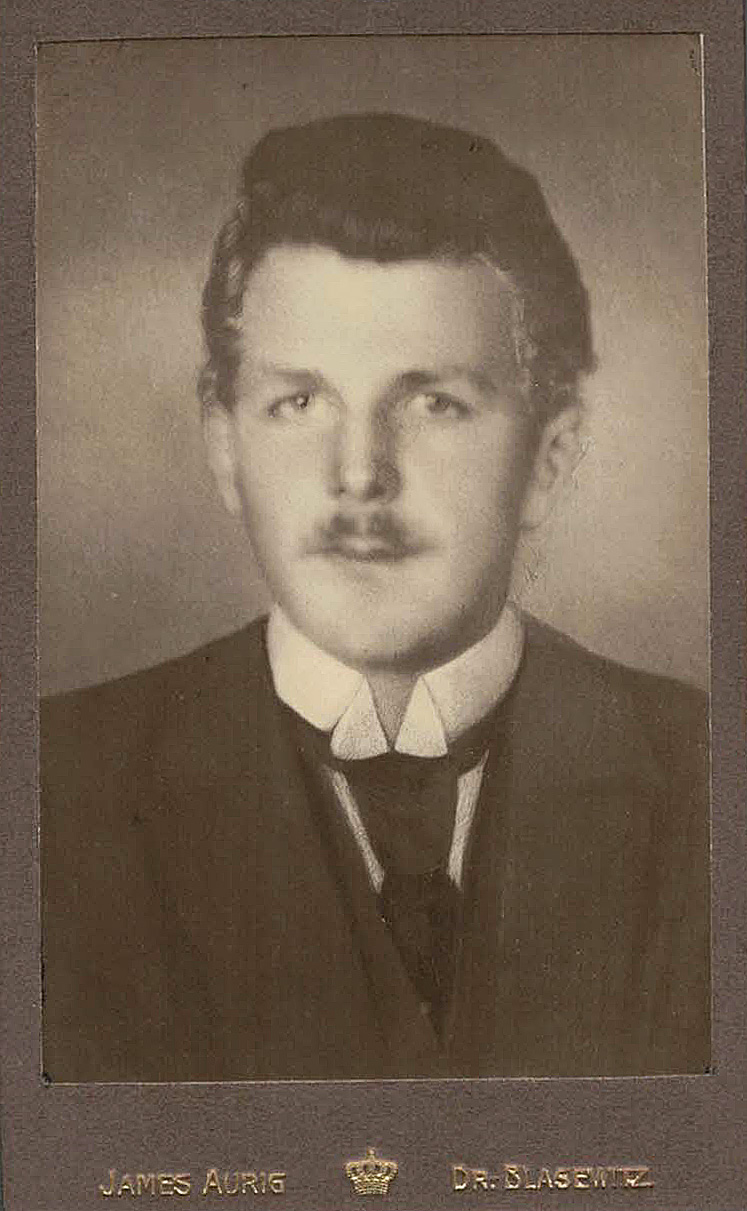This past weekend was Halloween and the theme for 52 Ancestors in 52 Weeks was “Frightening.” Unfortunately, no tales of the supernatural come to mind, so I will take a different route. I am probably more frightened of war than of ghosts, witches, zombies and vampires. War is about the most horrible thing I can imagine. We think of military heroes and revere them for defending our country, but how does one emotionally come to terms with a relative who was killed fighting for the other side?
Gustav Richard Max Lindner, “Max,” was my grandfather’s older brother. He was born 01 July 1888 in Dresden, Saxony, Germany, to Emil Heinrich Max Lindner and Anna Marie Lindner, born Kessler.
Max became a botanist and a teacher, which was different for my Lindner family. They were mostly in the trades for at least a few generations. He was just 26 when he died and he was unmarried.
Just like my mother told me about my Luther family, and about the death of her grandmother during the fire-bombing of Dresden, she would also tell me that my grandpa’s brother was killed during World War I. Yes, he was fighting for Germany. And what was really sad was that the family never knew what happened to him. They had tried very hard to learn, but they never found out anything. I heard this tale many times. I grew up believing that Uncle Max had just disappeared and was the equivalent of M.I.A. (missing in action). The idea that someone would be killed in battle and no one would know what happened to them was a frightening concept to me as a child, and it is still a frightening concept to me today.
Naively I had asked, “Why did Uncle Max fight for Germany?” ” Because, he had no choice,” was my mother’s answer. My grandpa probably would have had to fight too, if he hadn’t come to the United States before World War I broke out. Maybe he would have been killed, too.
For years I took this story of Max’s death very literally. He was killed in the war and nothing else was known. A few years ago, I decided to see if I could find out any more about his military service. I didn’t learn much, but what I did learn was that Max didn’t just disappear. He had a specific date of death and a location. The World War I Casualty Lists for Germany, 1914-1917, did indeed have a listing for him. He died on 10 September 1914 in Coole, Marne, Champagne-Ardenne, France. His title was noted as an “Unteroffizier,” which is the equivalent of a non-commissioned officer. His status was listed as “gefallen,” which indicates killed in battle. I began to think that surely his family must have know this, since it was published in an official military casualty list.
As I prepared to write this blog entry, I did a search of Ancestry.com to see if I had missed anything else. I was surprised to find a copy of Max Lindner’s death record among Dresden deaths. His death was reported by his father. It had one discrepancy from what I found. It showed his place of death as Coole, Belgium, instead of France. As near as I can tell, there is no Coole, Belgium. Since the information was reported by Emil Heinrich Max Lindner, I now know that Max’s family was aware of where and when he died. The death record also shows that Max was “gefallen.”
I think that when my family said they never knew what had happened to Max, they probably meant that they were never able to recover his body to bring him home for burial in Dresden. World War I was responsible for massive casualties. Germany deployed about 11,000,000 men and is reported to have lost 1,773,700 in battle. A complete list of casualties from “The Great War” can be found here.
Did Max have a choice about fighting? Probably not. But, would he have avoided service if he had the option? I doubt we will ever know. All I know that the loss of Max was a terrible tragedy for the Lindner family. He was a bright young man with a promising future. The incredible waste of human life when nations take up arms is truly frightening.


![Deat Record for Max Lindner; Ancestry.com. Dresden, Germany, Deaths, 1876-1952 [database on-line]. Provo, UT, USA. Original data: 6.4.25 Sterberegister/Sterbefallanzeigen. Digital images. Stadtarchiv der Landeshauptstadt Dresden, Dresden, Germany.](https://mysearchforthepast.files.wordpress.com/2015/11/max-lindner-death-cert-1914.jpg?w=208)
Hallo, Ich schreibe an einer Biographie meiner verstorbenen Mutter . Dabei kam ich auf ihre Mutter. Sie war die Braut von Gustav Richard Lindner aus Dresden. Ich habe eine intensive Korrespondenz zwischen meiner Oma und Herrn Lindner von 1910-1914, auch die Todesmeldung aus dem Feld und die Todesanzeige der Familie. Falls sie an weiteren Informationen interessiert sind können sie mir gern schreiben.
Mit freundlichen Grüßen
Barbara Dobritz
Hello, Barbara. I do not check my blog for comments very often these days. My goodness, I am not aware that Max Lindner was married. Are you sure we are talking about the same man? I know my great-uncle was called Max. Also, your name sounds very familiar to me, so maybe we have communicated about family before.
I am very interested in learning if my grandfather’s brother was married.
Kind regards,
Cheryl Biermann Hartley
email: cherylhartley ( use the symbol for at) gmail.com